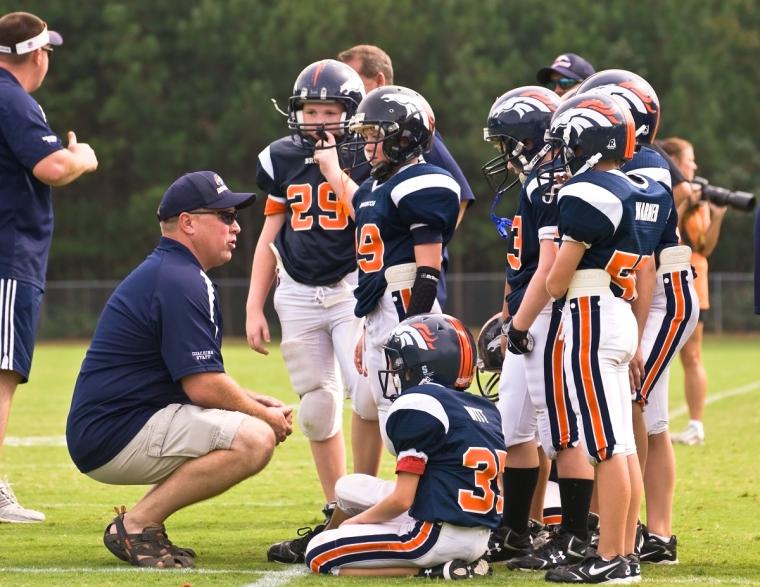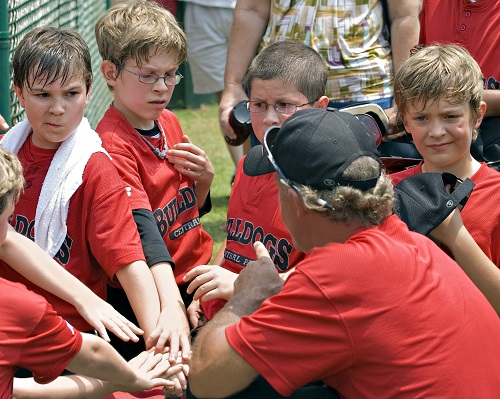
Coaches of youth sports teams are being called upon to do more than teach fundamentals and help players hone their skills — and it’s a task for which many of them feel ill-prepared.
Coaches need and want more assistance addressing the mental health of players. That’s one of the key takeaways from the Aspen Institute’s “State of Play 2022” report, which identifies the latest youth sports trends related to participation, physical and mental health, coaching and costs to play.
“Almost all coaches said they feel strongly about their ability to coach Xs and Os, foster a positive environment, and promote good sportspersonship. However, there was less confidence to deal with the mental aspects of sports,” according to the report, which incorporated results from the National Coach Survey, a 2022 study of youth sports coaches through research by The Ohio State University LiFEsports Initiative in partnership with the Aspen Institute, Susan Crown Exchange and Nike.
The National Coach Survey, a new addition to this year’s State of Play 2022 report, is a first-of-its-kind analysis of coaching behaviors, experiences and needs in the United States. The study surveyed more than 10,000 youth sports coaches from every state and in various sports and settings, and future results and analysis are expected to be published in 2023.
As the “State of Play 2022” report notes, “only 18% in the National Coach Survey reported feeling highly confident in their ability to link athletes to mental health resources. This was coaches’ second least-confident behavior behind helping athletes navigate social media pressures. Very few coaches felt confident in identifying off-field stressors for athletes (19%) and referring athletes to support (18%).”
“Mental health is clearly a need around the country right now. There is a mental health crisis particularly for kids, and it’s something that coaches aren’t prepared for, but they want to be better prepared for,” Jon Solomon, editorial director for the Aspen Institute Sports and Society Program, told EdWeek.org, noting that coaches can play an integral role in early detection of struggles kids might experience. “That doesn’t mean that coaches now should become trained psychologists. But if you think about it, coaches are on the ground with so many of these players in ways that teachers aren’t. Teachers have so many students, so they can’t potentially build the relationships that a coach could do on a team of 15 to 20 kids.”
This news comes as another study published earlier this year suggests that youth sports participants on team sports have fewer mental health challenges than other kids. However, those who participate in individual sports such as tennis and swimming have greater mental health challenges than those who don’t play sports.
The research covered more than 11,000 young athletes between the ages of 9 and 13 in the United States who fell into one of four groups: participation in team sports, participation in individual sports, participation in both team and individual sports, and no sports participation.
“We just need to pay attention perhaps a little bit more with kids who are playing individual sports,” Matt Hoffmann, one of the study’s authors and an assistant professor in the Department of Kinesiology at California State University, Fullerton, told KBTX.org.
An organization in Vancouver, B.C., Canada, called Buddy Check for Jesse has been working for more than four years “to give coaches the tools they need to talk to kids about the importance of taking care of mental health and getting ahead of issues by reaching out, and looking out,” according to the Vancouver Island Free Daily.
The program is named after Jesse Short-Gershman, a former athlete who died by suicide at age 22 in 2014, and was started by Jesse’s father, Stu Gershman — a physician who “believes that coaches are in a unique position to share a message to help raise awareness about mental health issues in their youth participants,” the program’s website explains. “The idea is to create an environment where teammates support one another and are more aware of potential mental health issues so they are prepared to step in with support when they see a teammate, friend or family member struggling.”
 Coaches can create that environment, Gershman told the Vancouver Free Island Daily, by doing a “buddy check” that can be as simple as putting an arm around a young athlete and letting them know it’s okay to reach out if he or she needs help.
Coaches can create that environment, Gershman told the Vancouver Free Island Daily, by doing a “buddy check” that can be as simple as putting an arm around a young athlete and letting them know it’s okay to reach out if he or she needs help.
“More than 70 percent of mental illnesses start before the age of 19, so what we’ve seen is message-building,” Gershman said. “[As a coach], you have a group of youth around you that are looking to you for guidance and looking to you for mentorship and looking to you to model behavior. Everybody’s got challenges, and a coach bringing that up is generally not expected, but the coach is a powerful role model in being able to do that with the youth, who are paying attention to them.”

